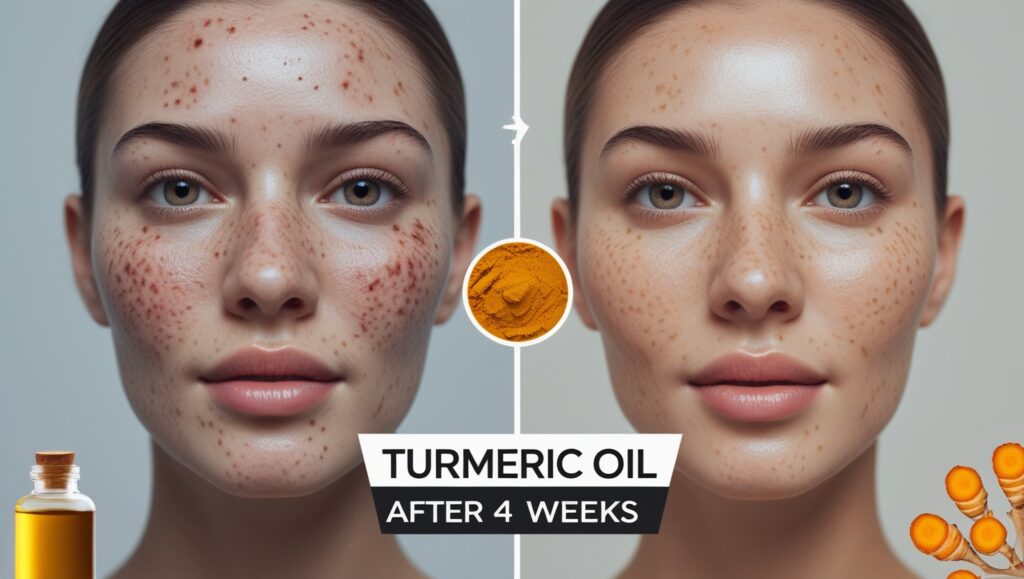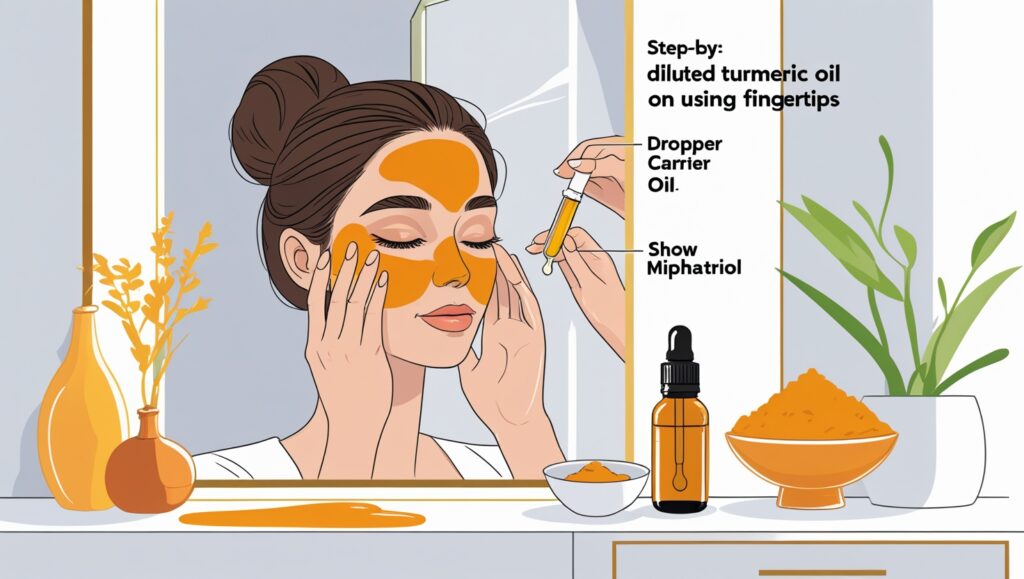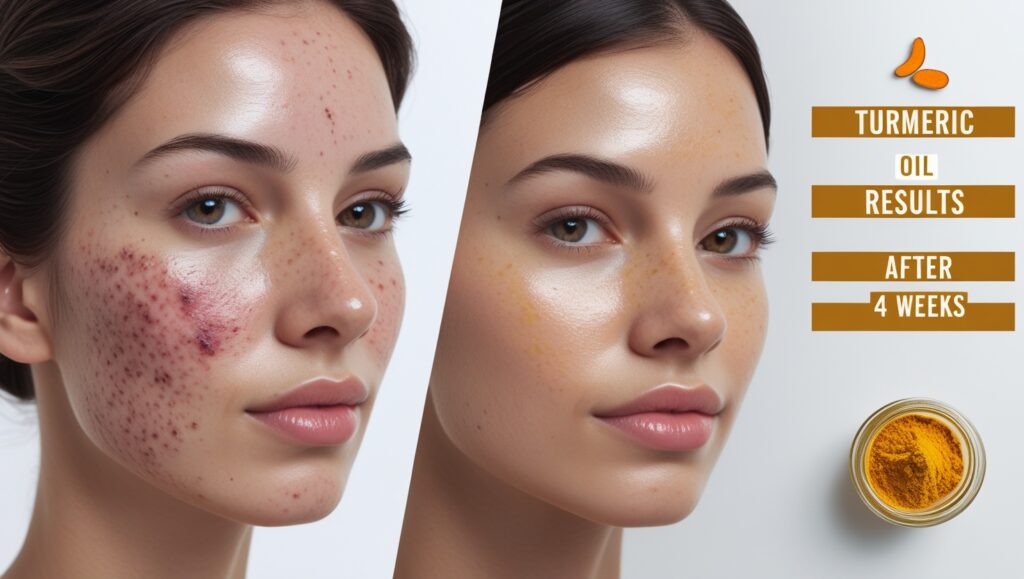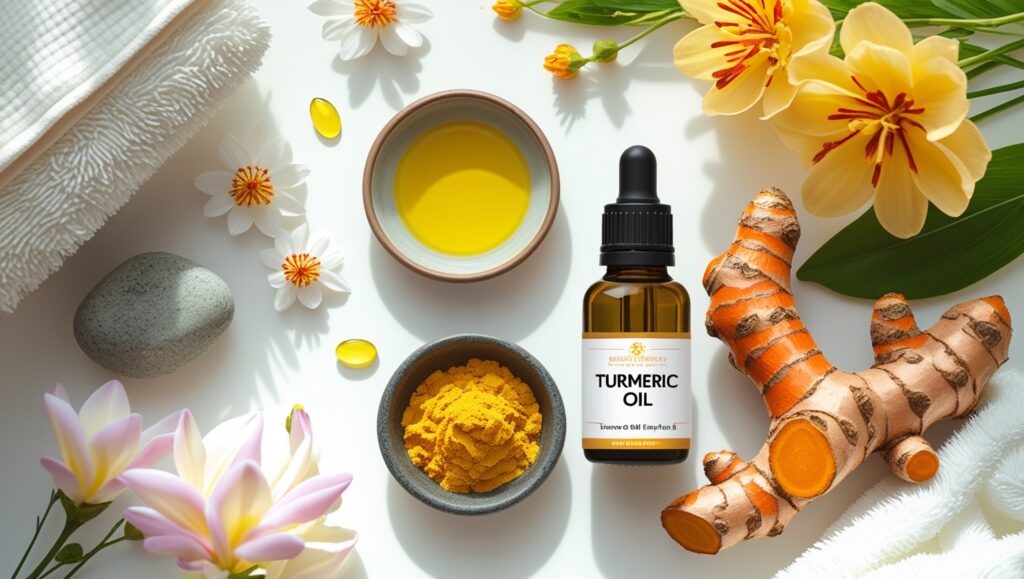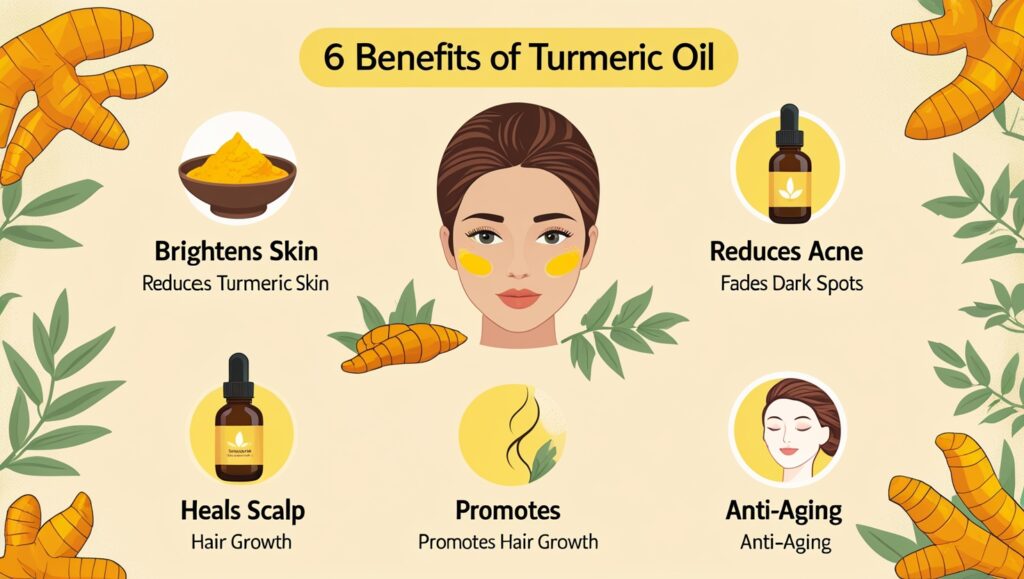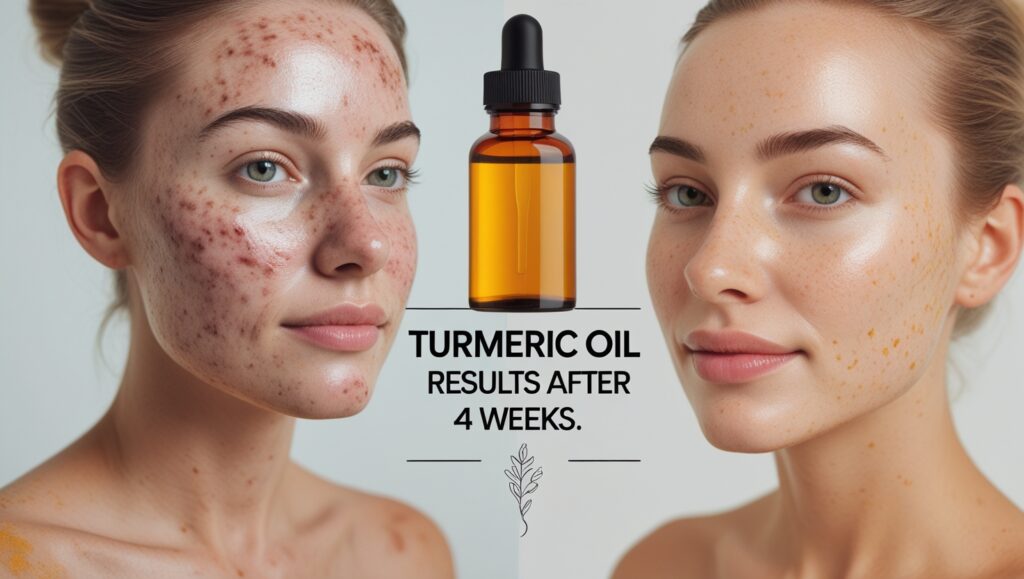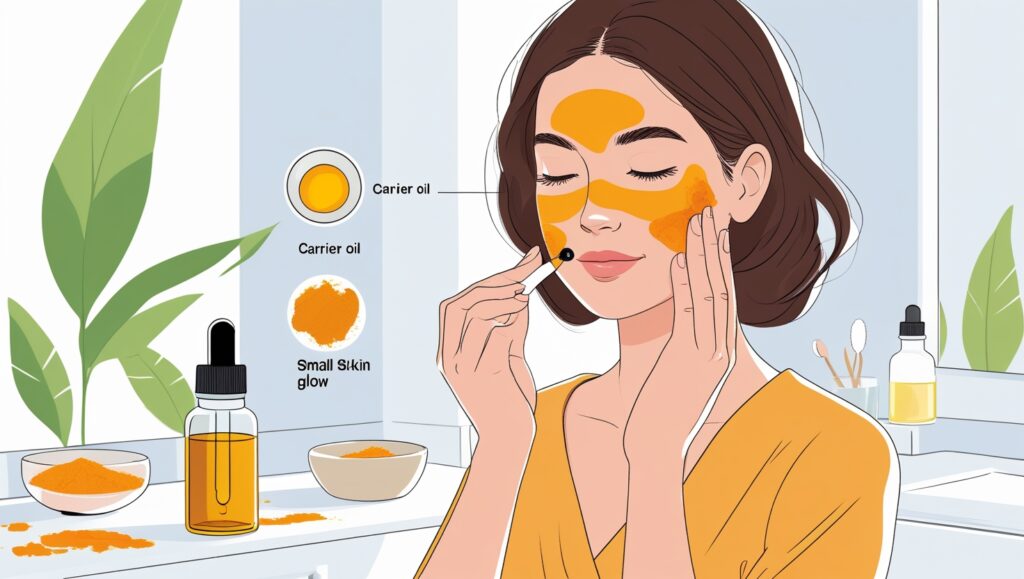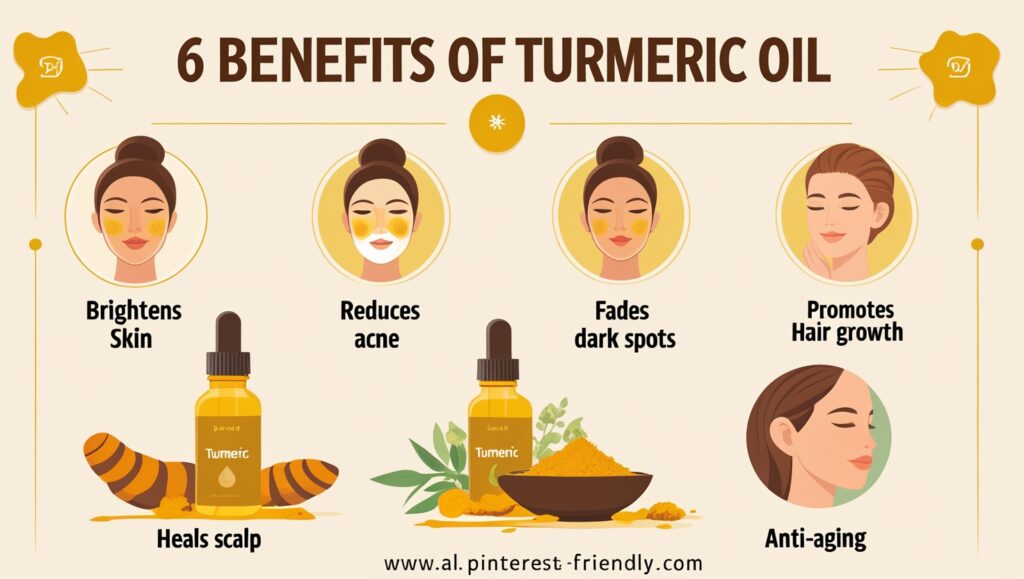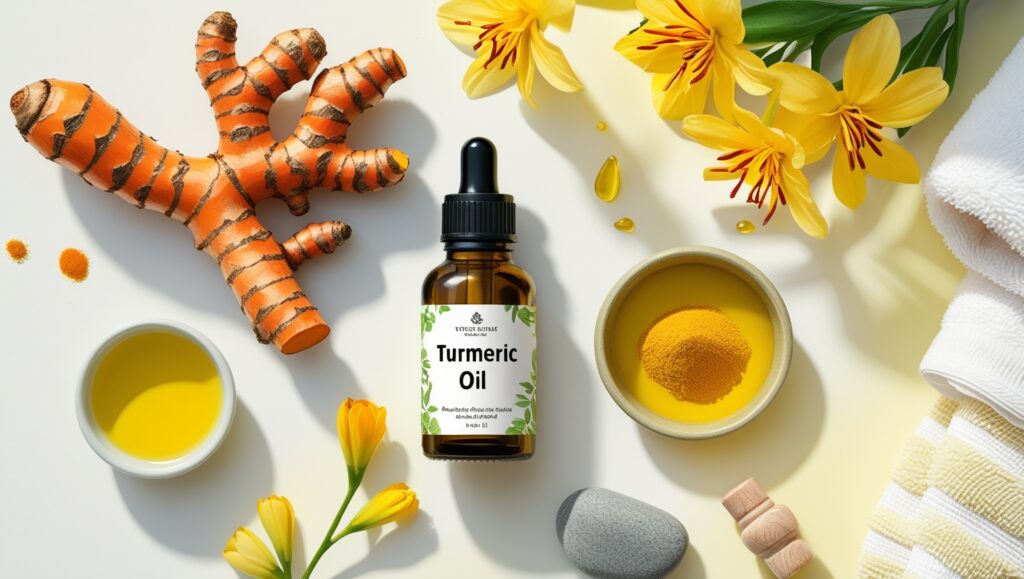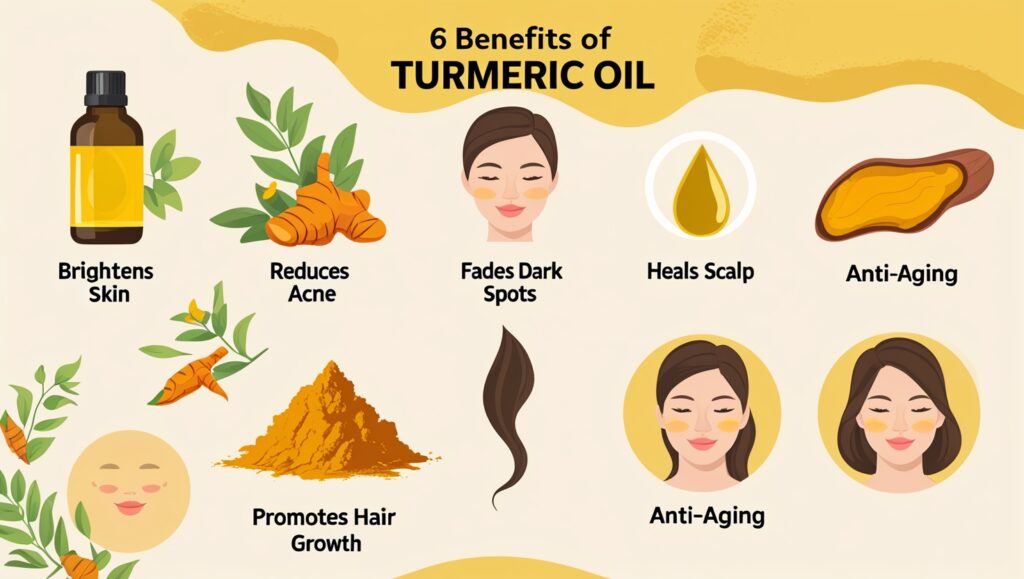Turmeric oil has taken the beauty and wellness world by storm—and for good reason. Known for its anti-inflammatory, antioxidant, and healing properties, it is more than just a traditional remedy. From treating acne and dark spots to improving scalp health and hair growth, this golden elixir is earning its place in skincare and haircare routines across the globe.
Let us uncover what turmeric oil is good for, explore its wide range of benefits, and guide you on how to use it effectively for your skin, face, hair, and more.
Uses of Turmeric Oil
What Is Turmeric Oil Good For?
Turmeric oil, extracted from the rhizome of the Curcuma longa plant, is a concentrated form of turmeric’s active compounds, primarily curcumin and turmerone. It is typically steam-distilled and highly potent in therapeutic properties.
USES:
- Skin Health – Soothes inflammation and brightens complexion.
- Hair Care – Fights dandruff and strengthens follicles.
- Anti-Aging – Reduces fine lines and wrinkles.
- Wound Healing – Speeds up recovery from cuts and burns.
- Mood & Immunity – Uplifting aroma and immune support when diffused.
Studies suggest that this oil may also offer antimicrobial benefits, making it ideal for acne-prone and sensitive skin types.
Turmeric Oil Benefits You Should Know
Turmeric oil is packed with active compounds that deliver multiple health and beauty benefits:
1. Anti-inflammatory Properties
Reduces redness, swelling, and irritation caused by acne, eczema, or sunburn.
2. Antioxidant Protection
Neutralizes free radicals that cause premature aging and skin damage.
3. Natural Skin Brightener
Curcumin promotes a radiant, even skin tone and fades pigmentation.
4. Antibacterial Action
Prevents bacterial buildup that can lead to breakouts and scalp infections.
5. Anti-aging Support
Stimulates collagen production and improves elasticity for youthful skin.
Turmeric Oil for Face : How to Use and Why It Works
This oil is a powerful natural remedy for common facial skin issues. Here’s how it benefits your face:
💡 Key Benefits:
- Reduces acne inflammation and redness
- Fades acne scars and dark spots
- Evens out skin tone and boosts radiance
- Tightens pores and firms the skin
🧴 How to Use:
- Mix 2 drops of turmeric oil with 1 tsp of carrier oil (jojoba or almond).
- Apply gently to clean skin before bedtime.
- Wash off in the morning with a mild cleanser.
Note: Always do a patch test before applying directly to the face.
Turmeric Oil for Skin : Healing, Brightening, and Protection
This oil is ideal for full-body skincare, particularly for those with dry, uneven, or blemished skin.
💛 Skin Issues It Can Help:
- Eczema, psoriasis, and rashes
- Stretch marks and scars
- Dry patches and flaky skin
- Sun damage and hyperpigmentation
🔄 Best Application Methods:
- Add a few drops to your body lotion or cream.
- Mix into bath water with Epsom salts.
- Use with aloe vera gel for DIY soothing balms.
Its natural yellow hue may stain temporarily, so dilute well.
Turmeric Oil for Dark Spots : Natural Spot Correction
Dark spots caused by acne scars, sun exposure, or hormonal changes can be reduced with consistent use of this magic oil.
🌟 Why It Works:
Curcumin inhibits melanin production, helping fade dark marks and even out skin tone over time.
📝 How to Apply:
- Mix 2–3 drops of turmeric oil with 1 tsp of rosehip oil.
- Dab directly on dark spots using a Q-tip.
- Use at night and follow up with SPF during the day.
Regular application (2–3 times a week) yields visible improvement within a few weeks.
Turmeric Oil Benefits for Skin Health
Here’s a quick list of how turmeric oil enhances overall skin health:
| Benefit | How It Helps Your Skin |
|---|---|
| Brightening | Promotes radiant complexion |
| Anti-Aging | Reduces wrinkles and fine lines |
| Acne-Fighting | Clears bacteria and soothes breakouts |
| Scar Fading | Reduces appearance of old marks |
| Skin Barrier Strengthening | Enhances hydration and protection |
| Anti-inflammatory | Soothes irritation and redness |
Add this magic oil to your skincare routine 2–3 times a week for best results.
Turmeric Oil for Hair Growth and Scalp Health
Yes, turmeric oil isn’t just great for skin—it can work wonders for your hair too.
🧠 Scalp Benefits:
- Fights dandruff and flakiness
- Reduces scalp inflammation and itchiness
- Improves blood circulation to the roots
- Strengthens follicles for hair growth
🛁 How to Use:
- Mix turmeric oil with coconut or castor oil.
- Massage into the scalp for 10–15 minutes.
- Leave it on for 30 minutes or overnight before shampooing.
Use weekly for visible results over 4–6 weeks.
FAQ’s
Can I use turmeric oil directly on my face?
No. It is highly concentrated. It should always be diluted with a carrier oil (like jojoba, almond, or rosehip) before applying to the skin.
How often should I use turmeric oil for dark spots?
Apply 2–3 times per week at night. Consistency is key, and results may appear within 3–4 weeks.
Is turmeric oil good for acne?
Yes. It has antibacterial and anti-inflammatory properties that help reduce acne, redness, and prevent future breakouts.
What are the side effects of turmeric essential oil?
Possible side effects include skin irritation, allergic reactions, or staining. Always do a patch test and dilute before use.
Conclusion: Should You Add Turmeric Oil to Your Routine?
Absolutely! Whether you’re targeting acne, dull skin, uneven tone, or hair issues, turmeric oil is a natural and effective solution. Its versatility across skincare and haircare, backed by ancient Ayurvedic wisdom and modern research, makes it a golden must-have in your wellness toolkit.
Start small, stay consistent, and watch your skin glow.
- https://www.ncbi.nlm.nih.gov/pmc/articles/PMC5664031/ – A peer-reviewed article from the National Institutes of Health discussing the use of curcumin (the active compound in turmeric) in treating dermatological conditions.
- https://www.ayush.gov.in/ – The official website of the Ministry of AYUSH, Government of India, which promotes traditional systems of medicine including Ayurveda and herbal therapies like turmeric oil.
- https://www.healthline.com/nutrition/turmeric-oil-benefits – A comprehensive guide from Healthline summarizing turmeric oil’s benefits, uses, and precautions based on expert reviews.
- https://www.webmd.com/vitamins/ai/ingredientmono-662/turmeric – WebMD’s medically-reviewed summary on turmeric’s health benefits, side effects, and recommended usage.

